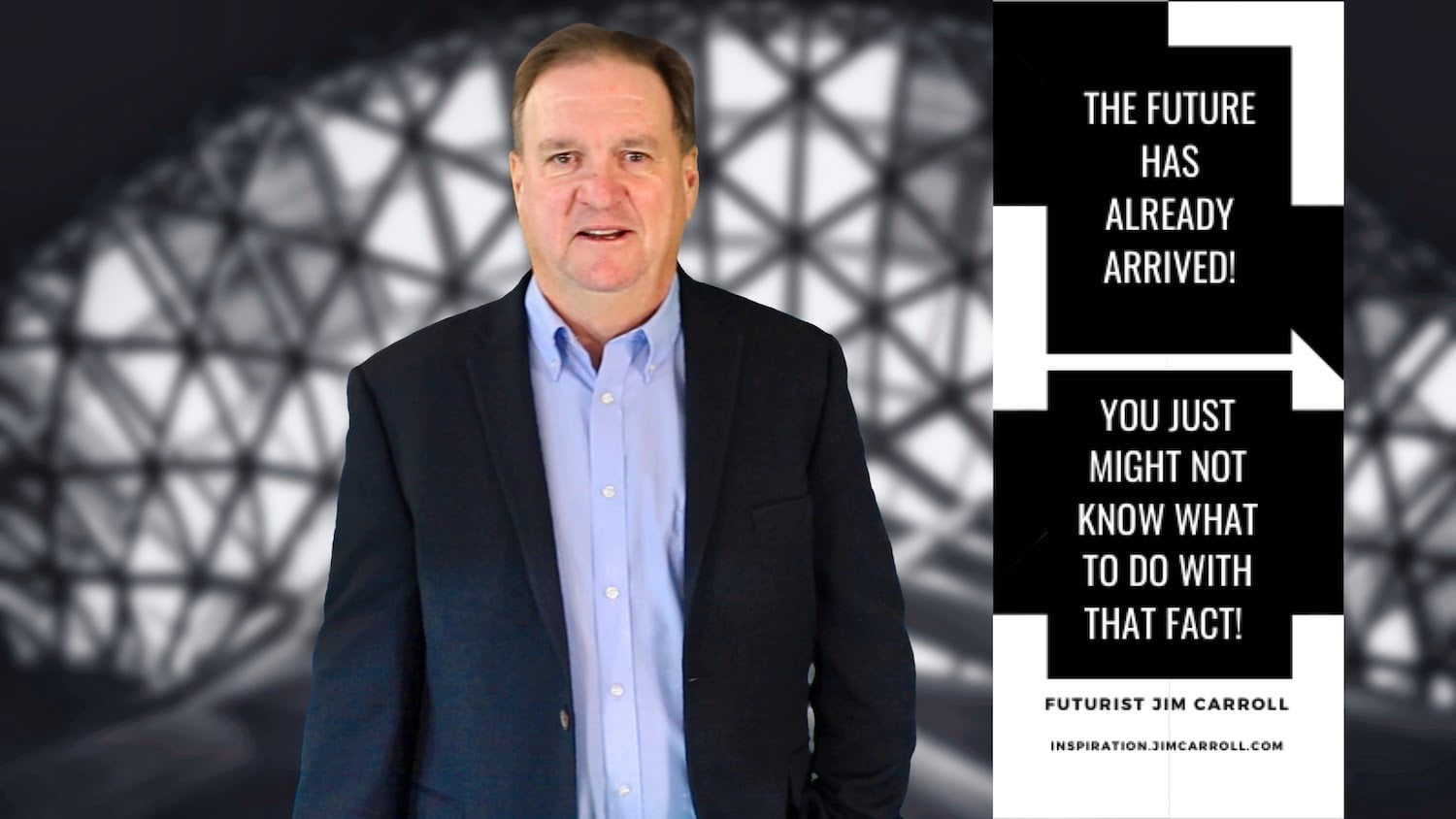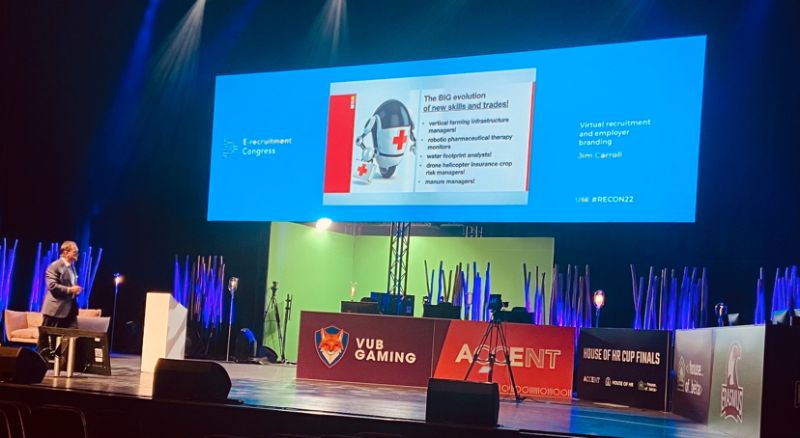“The future has already arrived! You just might not know what to do with that fact!” – Futurist Jim Carroll

The Jetsons has become a wonderful part of my stage presence over the last fifteen years – I use it to emphasize the point that while we thought the future is far away, much of it is already here today. We just take it for granted – and often, don’t know what to do with it, because either struggle with the speed of change, or don’t recognize the trends occurring all aorund us.
It’s a great story – The Jetsons was purportedly set in 2062, but I often point out that much of what is seen in the show is all around us today, as seen in this clip of a keynote in Chicago. What if we’re already living in the future? Are we acting fast enough to deal with it?
Here’s another version with visuals:
Today’s quote was inspired by a column that came out yesterday in Belgium that captured the essence of my keynote last week in Oostende. Teaser – I started out in a virtual broadcast studio that they built for me, hidden on stage – but then I surprised the audience when the curtain came up and they realized I was actually there. So much fun – I’ll have some wonderful videos in a future post.
For now, here’s the article that will get you thinking: are you already in the future and just don’t know what to do? This is a direct Google Translate version, originally in Dutch, and it reads pretty well!

How to recruit for jobs that don’t even exist yet?
‘Companies that do not yet exist will soon build products that have not yet been invented, with materials that have not yet been invented’, predicts futurologist Jim Carroll. But however to recruit the people for that?
Peter BoermanOn 09 May 2022
How to recruit for jobs that don’t even exist yet?
For a moment you think: that’s disappointing. Have you driven all the way to Ostend in Belgium, among other things to see Jim Carroll, and then he is only virtually present. In a nice entourage, that must be said. We see the head of the Canadian futurologist speaking at bus shelters, on telephones, and even mounted on the local beach. It nicely shows what is technologically possible today, and at the same time how we have become accustomed to these kinds of virtual presentations in recent covid years. But still: it also feels somehow: not real. Because somehow you feel cheated when he’s not live on stage.
Somehow you feel cheated when he’s not live on stage.
But look, then suddenly a curtain goes up on the stage. And there we suddenly see Carroll walking live, in front of a green screen, with all kinds of cameras aimed at him.

That his presentation has been so easy to follow, with crystal-clear sound? It had nothing to do with a good connection with the other side of the world, but with the fact that he was really just right in front of us. A more or less ‘reverse experience’, pretending to be virtual, when you are actually live. It’s a mindfuck that fits nicely with his central thesis: the future has already arrived. And we’re right in the middle of it now.
The JetsonsTo underline this statement, he refers to The Jetsons, that legendary science-fiction cartoon series, which made a furor from the 1960s as a counterpart to The Flintstones. A series that officially only takes place in 2062, but which nevertheless had a foresight. From microwave meals to mobile phones, and from facetime to telemedicine and home education; it was all there. Even Trump has already been given a spot. But what seemed impossible predictions at the time, have now all come true. And even 40 years earlier than the creators of the series expected. Except for those flying cars.
It just means, emphasizes Carroll: the future is here. And that future is changing faster than we usually think possible. According to him, this also has major consequences for the labor market and the way we recruit in it. ‘Think of that Australian study that shows that 65% of primary school children end up working in jobs that we don’t know yet. Or the research that shows that half of the knowledge that first-year students acquire will be outdated by the time they graduate.’
‘ 65% of primary school children find themselves in jobs that we don’t know yet.’
In other words: in such a rapidly changing world, how can you expect someone’s studies to predict their performance? “Companies that don’t exist yet will build products that have not yet been invented, with materials that have not yet been invented, using methods that have not yet been designed,” he says. ‘How are you ever going to recruit people for that? You’ll have to think about that now.’
Digital presence
In any case, digital presence is of the utmost importance for this, he emphasizes. ‘How can you ever become an employer of choice if you don’t have a digital presence ? And are not a digital professional? The new generation is fully digital. You’ll have to go along with that anyway.’ And timing also plays a major role, he says. ‘ The future happens slowly, and then – all at once. You have to be prepared for that. Also by recruiting for change that you see coming, but which you may not yet have to deal with. Because otherwise you’ll be late and fishing behind the net.’
What exactly does that mean for recruiters? ‘That you also have to become a bit of a futurist’, he tells his audience in the Kursaal . ‘You have to learn to predict the future.’ A few pointers here: not only will knowledge become obsolete faster and faster, and new knowledge will emerge faster and faster, but there will also be something like just-in-time knowledge. “And existing career paths will disappear and give way to zigzag routes, working longer than any generation before us.”
Loyalty is dead
With people who also have a different outlook on life, he says. ‘My generation still asks each other: what do you do in daily life? But the new generation asks each other: what do you like to do? They define themselves not by their job, but by what they like. In this context, everything is transactional. Loyalty is dead. They will resign as soon as they see a position that gives them a better reward in any form. They will consider staying somewhere for 2 to 5 years as long.’ It doesn’t necessarily make recruitment easier, but it does make it nice and challenging, says Carroll.
‘The new generation does not define itself by its work, but by what they like.’
Can’t robots make the difference in this, the Chad & Cheese also present in the room wondered? ‘How long will it take for robots to recruit other robots?’ But it won’t come to that, techno-optimist Carroll reassures his audience. ‘I am quite skeptical about many new technologies that I see emerging in the world of recruitment. And I think we will continue to cherish human interaction in the future as well.’




GET IN TOUCH
Jim's Facebook page
You'll find Jim's latest videos on Youtube
Mastodon. What's on Jim's mind? Check his feed!
LinkedIn - reach out to Jim for a professional connection!
Flickr! Get inspired! A massive archive of all of Jim's daily inspirational quotes!
Instagram - the home for Jim's motivational mind!